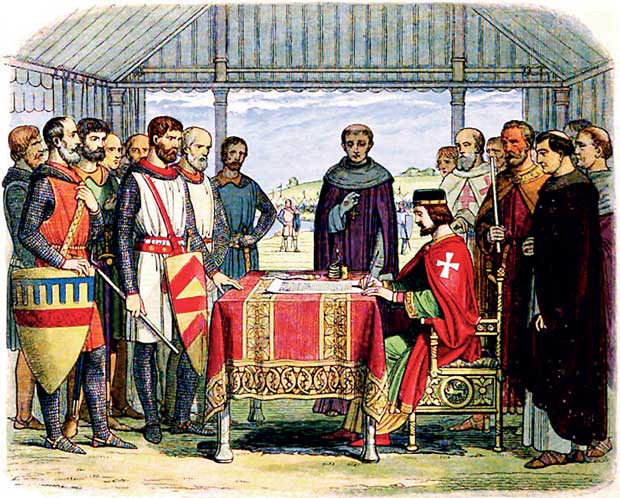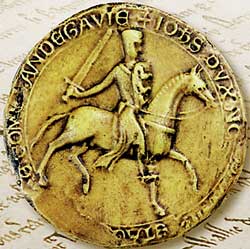Reply To:
Name - Reply Comment

.jpg)
Apart from its triumphant regime change in January, the Year 2015 could be distinctively marked as a year of Centenaries. Among them are the deposition of rule of last King Sri Wickrama Rajasingha in a successful conspiracy planned by the Sinhala chieftains and the signing of the Kandyan Convention acknowledging the British monarch, as their new ruler that occurred in 1815: the 1915’s catastrophic episode; eruption of communal riots, imposition of Martial Law and related atrocities that are haunting in historic records.
Several organizations and institutions in the United Kingdom are planning celebratory events throughout the country on Monday, commemorating the acceptance of The Great Charter or the Rule of Law by the people of England on June 15, 1215. The Archbishop of Canterbury drafted the Charter to make peace between the unpopular monarch, King John of England and a group of rebel barons. It promised the guard of Church rights, protection for the barons from unlawful arrest and imprisonment, access to swift justice, and limits and restrictions on feudal payments to State, which was to be executed through a board of 25 barons. However, the two parties were not committed to the implementation of the charter, and it was annulled by the head of the Church leading to ‘the Barons’ War’. It was re-enacted after dropping of some of its radical inclusions by King Henry, the son who succeeded King John in 1216, but he was unsuccessful too. At the end of another civil war, it finally saw the light of day as part of the peace treaty in 1217, more importantly, it got its name as Magna Carta of 1215.
King Henry’s son, Edward I , continued the application in 1297, making it a component of England’s statute law. Even though nearly all of its content was revoked from the statute by the 20th century, the charter continued to be a powerful, symbolic deed. The Magna Carta still figures as a significant mark of Independence often referred to by politicians and historians and is held in high veneration by the legal profession as “the greatest constitutional document of all times.” Only three Magna Carta clauses remain on statute in England: they are clauses concerning the Right to due legal process, Freedom of the English Church, and the “Ancient Liberties” of the City of London. In 1642, England was set in a civil war which saw numerous instances of armed conflict between the Royalist factions and the Parliamentarians.
, continued the application in 1297, making it a component of England’s statute law. Even though nearly all of its content was revoked from the statute by the 20th century, the charter continued to be a powerful, symbolic deed. The Magna Carta still figures as a significant mark of Independence often referred to by politicians and historians and is held in high veneration by the legal profession as “the greatest constitutional document of all times.” Only three Magna Carta clauses remain on statute in England: they are clauses concerning the Right to due legal process, Freedom of the English Church, and the “Ancient Liberties” of the City of London. In 1642, England was set in a civil war which saw numerous instances of armed conflict between the Royalist factions and the Parliamentarians.
Flaws of democracy
Issues of inequality are widespread within many sects of the world; history speaks of cases where people were silenced due to their race, caste social status and position at birth. Under democracy they are given a say, a chance to be heard. It protects the individual’s right to act and to address, it does not suppress or silence. The principle of majority rule inherited in the democratic process though appears fair as it caters to the desires of the majority, a significant drawback in the phenomenon is, it ignores the needs of the minority groups or invariably overshadowed by the force of the majority. Despite these limitations, democracy is a model that holds close to people’s most idealistic character and behaviour. Ideological institutions for that matter, are not without flaws; neither are they perfect. The notion of democracy as we conceptualize, its power and authority that gives people the right to expression and an element of political freedom, undoubtedly are invaluable in modern human thinking.
The efficiency of democracy is subjected to the argument that voters are foolish or otherwise very much uninformed about many political problems, especially those concerning finance and economics, though having a strong prejudice about non- issues which they are conversant with. They may not be sufficiently educated to be able to forecast the future of their community, and therefore, are incapable of deciding their preferences. Such a person would certainly cast a vote by the celebrity or charisma of the candidate or for other apparent causes. An ordinary man may also be tempted to cast a vote for little financial benefit or for petty election promises.
Political stability of a nation under democracy
Political stability of a nation under democracy is another serious issue. As elected governments are subject to change frequently, changes in the policies of both internal and international relations too becomes frequent. Protests and unkind criticism from sections of the media would force unanticipated political change. Also changes with regard to policies on commercial foreign investments are likely to discourage investor interest leading to negative effects on economic growth.
Strengthening Constitutional Council
The Constitutional Council consists of ten members, of whom seven or the majority are from peoples’ representatives with only three respected figures who will have little or no say in appointing men with impeccable integrity to the proposed Commissions. The ratio needs to be reversed; further having ministers who are ‘obedient servants’ of the head of the Cabinet, who himself is another politician sounds illogical. While restricting the number of parliamentarians to three, the total councillors should be increased to accommodate more men from civil society like retired public servants who did not belong to the boot-licking category as we have witnessed over the past few decades. Retired SC Judges, Chief Justices [leaving out jokers who provide entertainment over the media; or the ‘keep me there, I will deliver judgments to you honour’s fancy’ kinds or the ‘give my husband a job in return for rulings in your favour’ types] but men of the calibre of G. P. S. de Silva, Asoka Silva, Sharwananda or Vigneswaran. By appointing more, having 15 to 20 or so, the CC can split itself into two or more Sub Councils, with a mandate for scrutinizing policies and decisions of the government and also if powered by a statutory enactment to give such effect as to interfere in all matters concerning finance and accounting facets of any ‘good’ or ‘bad’ governance.
Talking of Centenaries, why miss the birth of maestro Sunil Santha in 1915, who sang that scintillating piece among many, “Nalevee sanesenney,…mage sudu olu maley”
Dictatorship naturally arises out of democracy, and the most aggravated form of tyranny and slavery out of the most extreme liberty.
- Plato